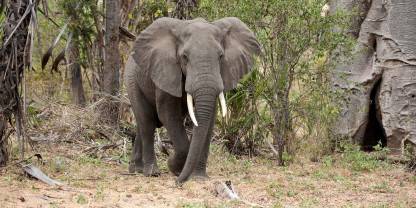Niassa Special Reserve is the largest conservation area in Mozambique and Africa’s third-largest wildlife sanctuary. It borders Tanzania’s Nyerere National Park (formerly Selous Game Reserve) without fences, so animals move freely around this vast combined area. It’s one of the most impressive ecosystems in Africa, yet totally lacking any tourist facilities.

-
Best Time To Go
- July to October (Animals are easier to find)
-
High Season
- Never (Little-visited reserve)
-
Size
- 42,000km² / 16,216mi²
-
Altitude
-
146-1,269m /479-4,163ft
 View Photos
View Photos
 View Photos
+12
Photos
View Photos
+12
Photos
Pros & Cons
- Pristine, unspoiled wilderness
- Off-the-beaten-track destination
- Reasonable wildlife viewing and superb birding
- No formal accommodations at present
- Remote and difficult to get to
- Animals are skittish and the wildlife density is quite low
Wildlife
Although wildlife isn’t that easy to spot in Niassa, there is plenty. Four of the Big Five are present (rhinos are locally extinct). There is a healthy elephant population, but buffalo is less common. Predator sightings are hit-and-miss, but you might hear spotted hyenas whooping at night. Common primates include yellow baboon, vervet and . The Lugenda River is home to lots of hippos and crocodiles.
More about Niassa’s wildlifeScenery
Miombo forest covers half of the reserve, making this one of the largest tracts of miombo in the world. The remainder is mostly open savannah, with some wetlands and isolated patches of forest. The scenery is dominated by the Lugenda River and immense granite domes rising up from the surrounding plains.
Activities
At present Niassa can only be visited on a tailor-made expedition. You’ll probably stay at the Lugenda River. From there you might do , and canoeing trips.
Weather & Climate
Niassa’s climate is hot and tropical. Temperatures are quite uniform throughout the year, but they peak in October and November, just before the rains. The Wet season, from November to April, is very humid and thunderstorms are common in the late afternoon. The coolest months, from June to August, offer comfortable travel conditions.
More about the weather and climateBest Time To Visit
As is usually the case, the best time for wildlife viewing is from the middle to the end of the Dry season, during the months from July to October. At this time, animals gather around sources of drinking water and the bush is thinner. However, October sees a rise in temperature and humidity, which can be too extreme for comfort. The reserve might close during the wet months from December to April.
More about the best time to visit
